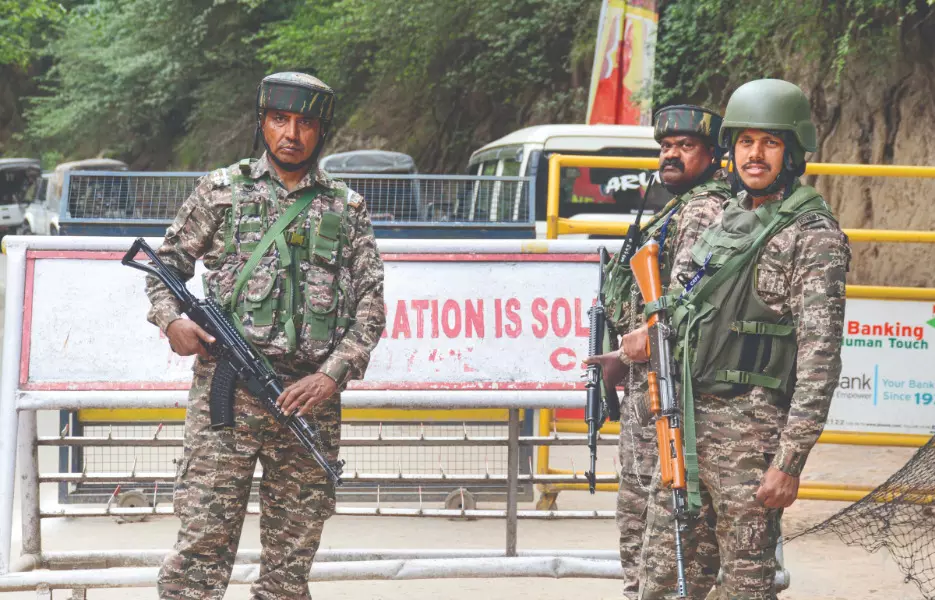After Pahalgam terror attack, India adopts strategy of restraint, heightened readiness

New Delhi: In the aftermath of the horrific terror attack near Baisaran in Pahalgam on April 22, which claimed 26 lives, the Indian Army has adopted a calibrated strategy to neutralise threats while avoiding precipitous escalation. Defence sources confirmed on Friday that while the armed forces remain in a state of high operational readiness, their response has been marked by strategic restraint, reflecting a refined approach to deterrence and counter-terrorism.
The attack, claimed by Pakistan-based militants, targeted a group of tourists and local guides in one of Jammu and Kashmir’s most frequented scenic areas. In its wake, the Indian Army swiftly intensified counter-insurgency operations across South Kashmir, deploying additional troops to re-dominate and sanitise vulnerable zones, it claimed. Security grids have been tightened along the Line of Control (LoC), where intelligence inputs suggest heightened attempts by terror groups to infiltrate.
Sources within the Army Headquarters emphasised that restraint does not equate to inaction. “Our forces are fully prepared for swift and decisive retaliation, but we will not fall into the trap of reactive escalation,” senior officer stated. This approach is designed to deny Pakistan opportunities to exploit instability or frame India’s actions as aggressive posturing. Recent provocations, including a surge in ceasefire violations by Pakistani forces to shield terror launchpads, have been met with “proportionate and precise” retaliatory fire from Indian troops, ensuring tactical superiority without ceding the moral high ground.
On the ground, joint operations involving the Army, Jammu and Kashmir Police, and central agencies have disrupted networks linked to the attack. Over the past week, multiple raids led to the arrest of key operatives associated with the “Pahalgam cell”, a module allegedly activated by the Lashkar-e-Taiba (LeT). Security forces also recovered weapon caches, including AK-47 rifles, grenades, and communication devices, from hideouts in Pulwama and Anantnag.
Temporary restrictions on civilian movement in high-risk tourist areas (48) were implemented to preempt follow-up strikes, though authorities have been careful to balance security with economic concerns. “Tourism is the lifeline of Kashmir’s economy. Our measures are surgical, not sweeping,” a military spokesperson noted.
During a high-level security review chaired by Prime Minister Narendra Modi on April 29, sources said that the Chief of Defence Staff (CDS) and service chiefs were granted full operational authority to determine the timing, scale, and targets of India’s military response. This delegation underscores the government’s confidence in the armed forces’ capacity to execute measured, intelligence-backed actions.
While cross-LoC strikes remain an option, officials indicate that the immediate focus is on degrading terror infrastructure through precision tactics. Satellite surveillance and drone monitoring have been ramped up to track movements across the LoC, with special forces units on standby for targeted operations. “We retain escalation dominance. Any response will be lawful, deliberate, and effective,” the CDS affirmed.
India’s military strategy aligns with broader diplomatic efforts to isolate Pakistan globally. The suspension of water-sharing under the Indus Waters Treaty and the cancellation of visas for Pakistani nationals signal New Delhi’s resolve to impose costs for state-sponsored terrorism. These steps, endorsed by the Cabinet Committee on Security, aim to erode Islamabad’s capacity to sustain proxy warfare.
Defence analysts suggest that India’s multi-domain approach—combining military readiness, economic pressure, and diplomatic isolation—reflects a matured doctrine of deterrence. By refusing to play by Pakistan’s script, India has seized the initiative.
As funerals were held for the victims, national sentiment has rallied behind the armed forces. Memorial services across India honoured the deceased, with citizens and political leaders reaffirming solidarity with Jammu and Kashmir. The Army, meanwhile, has intensified outreach in local communities to counter radicalisation and gather actionable intelligence.
While the government has ruled out dialogue with Pakistan until it ceases cross-border terrorism, backchannel communications with major powers, including the U.S. and Gulf states, are underway to highlight Islamabad’s destabilising role.
The nation now watches, united in grief and resolve, as its armed forces prepare to turn the tide against terrorism—with precision, purpose, and an unwavering focus on the rule of law.



